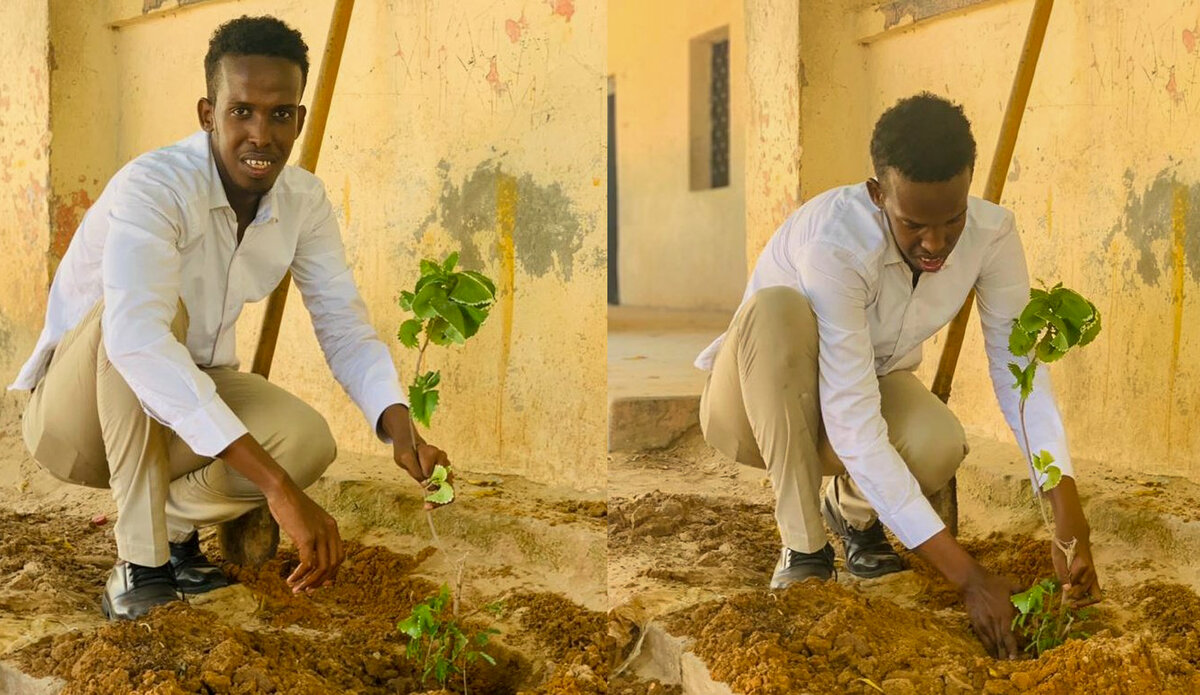Ahmed Abdi Osman ‘Farole’: a young visionary reshaping Somalia's future through environmental activism
Mogadishu – Somalia is reeling from a series of climate disasters that have sparked severe and lasting humanitarian emergencies. Droughts, famines and floods have battered the country, drawing the attention and intervention of the Somali government and international entities such as the United Nations.
But, in the midst of Somalia's many challenges, another group is doing its part to help: its youth. And among Somali youth, one of the individual activists who stands out in this regard is Ahmed Abdi Osman 'Farole.'
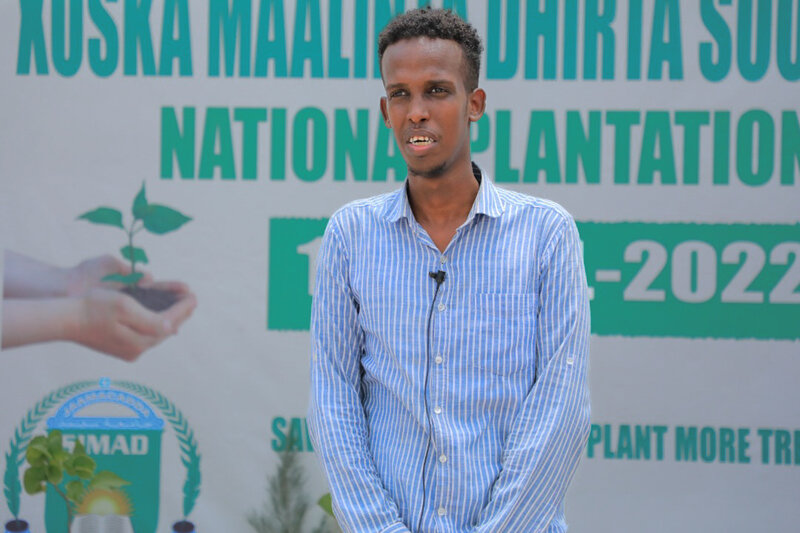
"Our country faces numerous climate change challenges such as droughts, famines and floods. An example of this is the recent flooding crisis in Belet Weyne. My own family was affected as well," he says. "I chose to be an environmental activist to shift our people's perceptions on these issues."
The 24-year-old was born in Mogadishu in 1998, amidst the violence that was then ravaging the Somali capital during its civil war.
From a young age, he was aware of the country’s environmental situation, first through the devastating impact of the civil war he witnessed around him and, subsequently, the profound impact of climate change on his country’s already-weakened environmental sector.
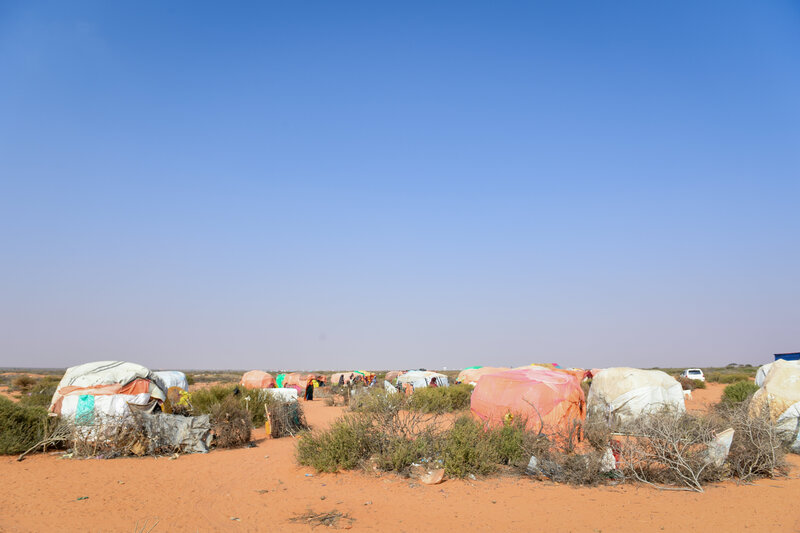
Mr. Osman studied at the Al-Imra Primary and Secondary School between 2009 and 2017, after which he went on to tertiary study at the Somali National University (SNU). He graduated with a bachelor's degree in agriculture and environmental science in 2022 from SNU’s Faculty of Agriculture and Environmental Science, and he knew what career path he wanted to pursue.
"My aim is to utilise my education to effect meaningful change in Somalia, particularly in the realm of climate change mitigation and adaptation. Youth play a crucial role in tackling this global challenge," Mr. Osman says.
"Young people are the ones who will inherit the consequences of this crisis, and it is up to us to find solutions. I am committed to collaborating with fellow young people to drive change," he adds.
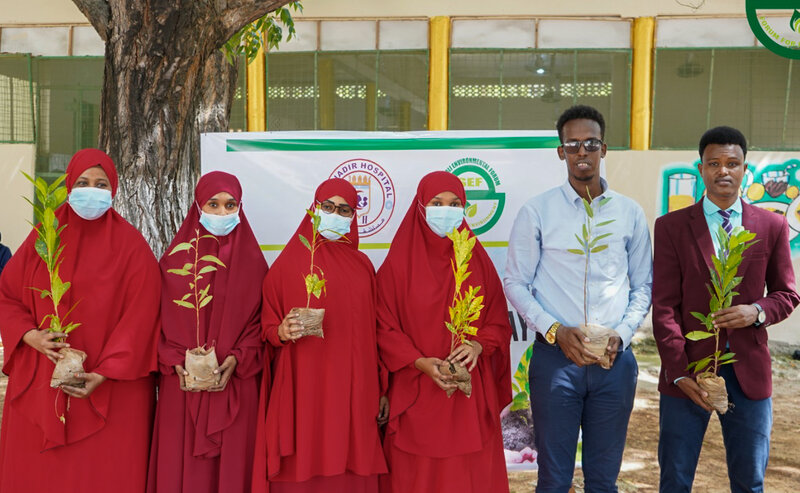
Early activism
The young man’s climate change activism kicked in even before he graduated. In late 2021, he established the Somali Environmental Forum (SEF), a non-governmental organisation (NGO).
"SEF is a youth-led organisation committed to raising awareness about the environment and climate change in Somalia. We organise events and campaigns to educate the public about these pressing issues," Mr. Osman notes. "Our work encompasses awareness-raising, capacity-building and tree planting."
SEF has already made progress in greening some parts of Somalia. Its volunteer members have planted hundreds of trees at schools, hospitals and universities in seven districts of Mogadishu.
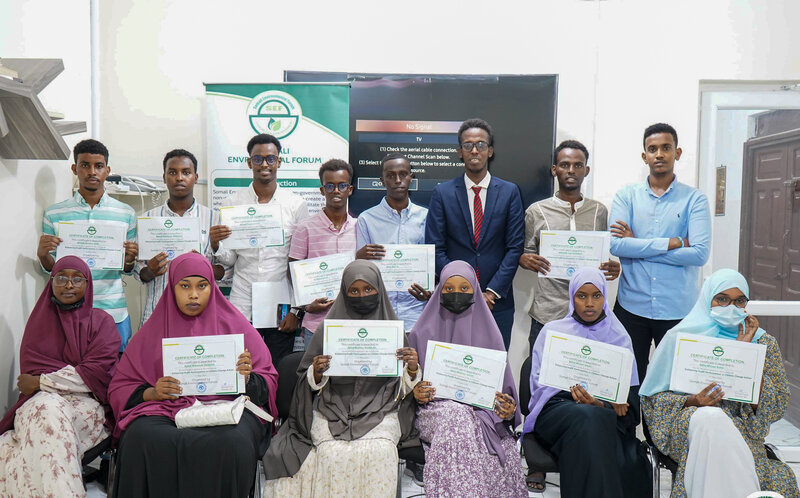
"We have planted 100 trees at the 21 October School, Hoyga-Hamar School, and Jabuuti School, as well as 150 trees at Martini Hospital, 200 trees at the Somali National Army Hospital, 100 trees at the Benadir Hospital, and another 100 at SIMAD University's town campus," Mr. Osman says, with a hint of pride in his voice.
Also, in partnership with entities such as Save the Children and the Somali NGO Consortium in 2022 and 2023, SEF has conducted workshops and training sessions on youth, peace, and the environment in Somalia, with an emphasis on the linkages between climate change and peacebuilding, youth, and a country’s overall development.
Using social media
With a high degree of savvy, Mr. Osman uses social media platforms – particularly the two most popular platforms in Somalia: Facebook and Twitter – as well as traditional news media platforms, such as radio and television, to spread the word about safeguarding Somalia’s environment.
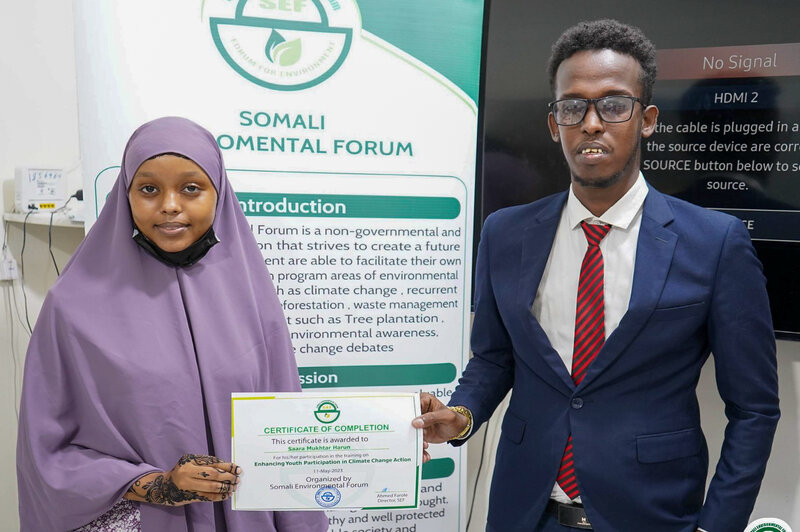
In February, SEF held a Twitter Space panel discussion, entitled ‘Women and Climate Change in Somalia.’ In October 2022, the NGO, in collaboration with Astaan TV, organised a series of panel discussions entitled ‘Somalia and Adaptation to Climate Change'. The events drew participants from high levels of the Somali government and academia, and large audiences.
"These initiatives aimed to raise awareness and foster meaningful discussions on pressing environmental issues," Mr. Osman says.
In his opinion, Somalia has a long way to go in terms of making the environment and climate change top issues for consideration as the country seeks to build a stable, peaceful and prosperous future. He notes that although Somalia is lagging behind in addressing climate change, it has made a good start, and these initiatives need to be nurtured.
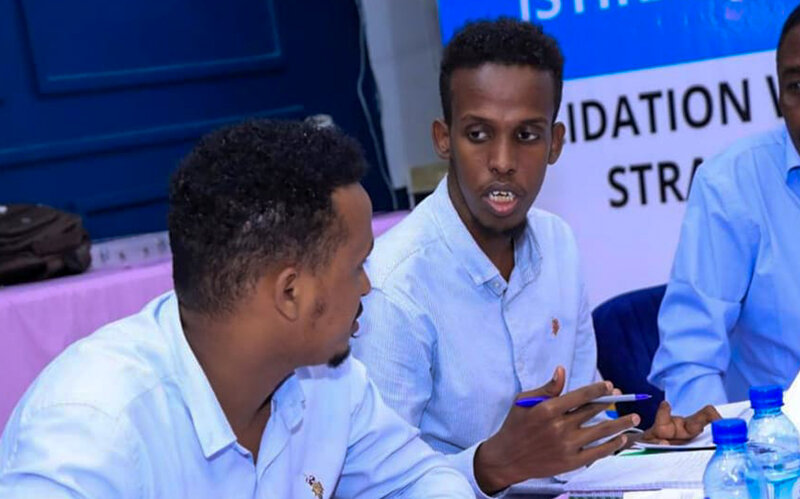
"The climate crisis is a global crisis, and Somalia is making efforts," he affirms. "For example, the government has established a dedicated Ministry of Environment and Climate Change that is committed to tackling these challenges."
Although Mr. Osman agrees with the general consensus that Somalia, like many other developing countries, is paying a price for climate change caused by developed countries, he emphasises the importance of Somalia's responsibility as well.
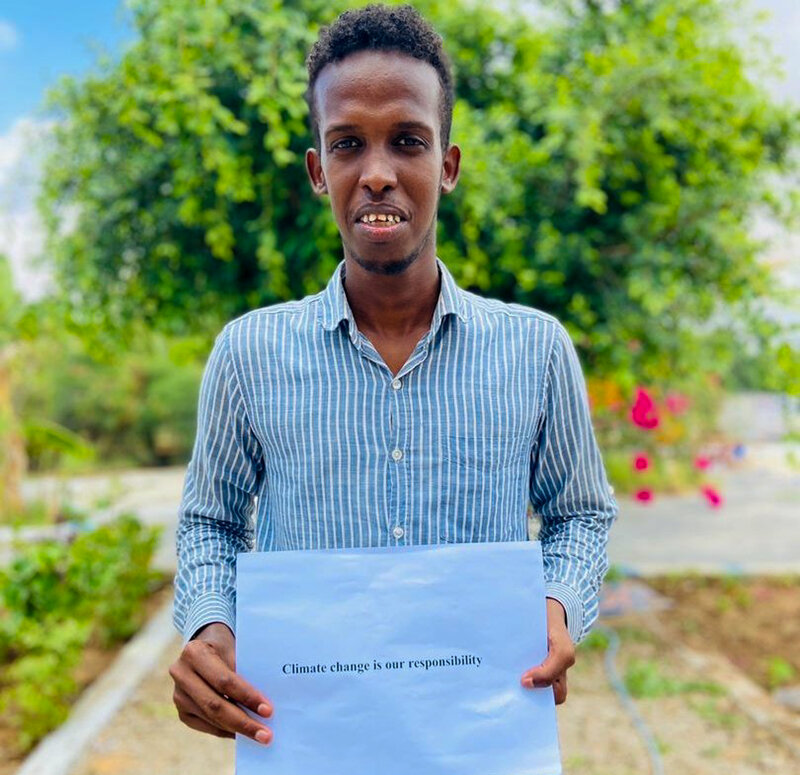
"For thousands of years, we Somalis have contributed to environmental degradation. Deforestation, soil erosion, land degradation, and inadequate waste management have been ongoing issues. It is now time for a shift in people's mindsets," he says. "While Somalia faces formidable challenges, the determination to tackle these issues head-on reflects a growing awareness and resolve to protect the environment in Somalia."
The United Nations has welcomed the fact that Somali youth are participating in these discussions and debates.
"Youth engagement is paramount as they are the next leaders and communities who are inheriting the impacts of climate change. Bringing in young voices like that of Farole is key in getting leaders to understand the scale of the change that needs to happen, but the youth are also the ones who have the solutions and ideas to make that change happen," says Christophe Hodder, the UN Climate Security and Environmental Advisor.
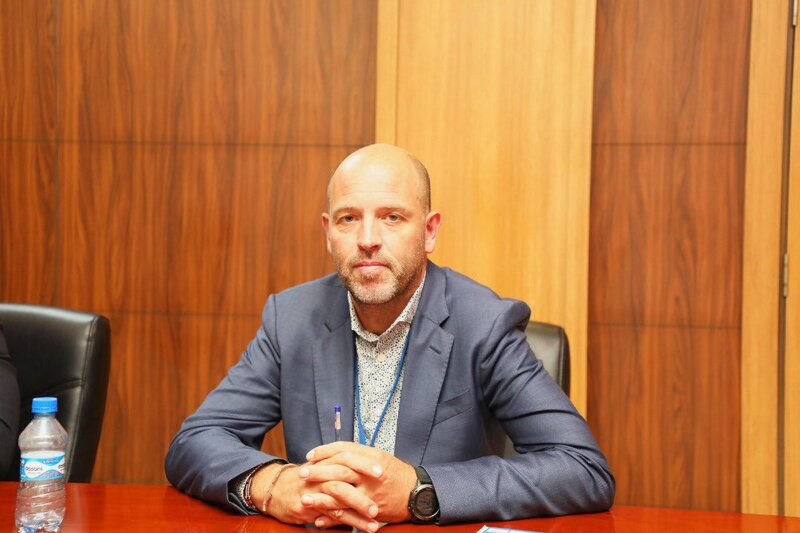
UN and climate change
According to the UN Environment Programme (UNEP), land degradation is a key environmental issue in Somalia, closely linked to desertification, drought and unsustainable livestock and agricultural practices. Food insecurity and livelihoods, possible hazardous waste, a lack of marine and coastal management, and the mitigation and management of natural disasters are other environmental concerns.
"Somalia is at the forefront of climate change and is seeing more and more climate shocks – such as the recent flooding in Belet Weyne – undermining the attempts at state- and peace- building," says Mr. Hodder.
"With 2080 projections suggesting the country will be reaching between a 1.4 and 3.4 rise in average temperatures and where we are expecting 50 per cent less water availability in the country," he adds, "urgent action is required to bend these trends and to support communities to adapt to these changing realities."
The UN Assistance Mission in Somalia (UNSOM) has been at the forefront of tackling climate-related issues in Somalia. It is one of the world body’s few special political missions to incorporate climate-related language into its mandate and has been leading the way since 2020, when it became the first mission to deploy an environmental and climate adviser – Mr. Hodder – dedicated to implementing these crucial objectives.
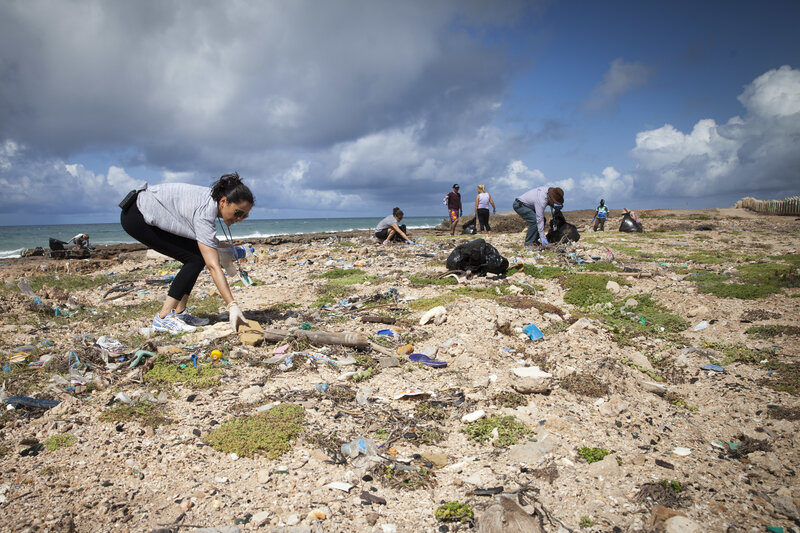
The United Nations marks World Environment Day on 5 June every year, following a General Assembly resolution designating it as such and urging, "governments and the organisations in the United Nations system to undertake on that day every year world-wide activities reaffirming their concern for the preservation and enhancement of the environment, with a view to deepening environmental awareness." Similarly, on 17 June, the United Nations marks the World Day to Combat Desertification and Drought to highlight desertification as a global issue, with serious implications worldwide for biodiversity, eco-safety, poverty eradication, socio-economic stability and sustainable development.
 UN
UN
